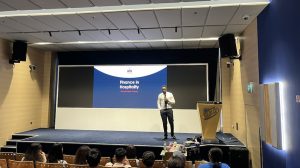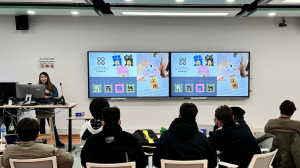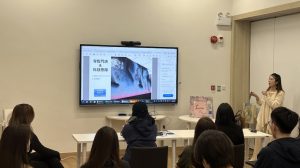On 27 October, Year 4 students in IFTM’s Heritage Management Bachelor’s Degree Programme attended a guest lecture titled “Cultural Heritage in a Dynamic and Fast-Changing City – Hong Kong.” Hosted by Dr. Vicky Chen Zhaoyu, the lecture was delivered by Mr. Lai Chi Pong, an Adjunct Assistant Professor at The University of Hong Kong, as part of IFTM’s Intangible Heritage course.
The presentation aimed to expand students’ knowledge of intangible cultural heritage, and draw lessons from good practice in safeguarding intangible cultural heritage in the neighbouring city of Hong Kong.
Mr. Lai teaches in the Bachelor of Arts (Conservation) and Bachelor of Science (Surveying) programmes of the Division of Architectural Conservation Programmes at The University of Hong Kong. He has published various work on Hong Kong’s tangible and intangible cultural heritage.
Commencing with modern Chinese history in the 16th century, and the development of commerce and trade in Hong Kong, Mr. Lai highlighted important historical stages in the development of modern Hong Kong, such as its industrialisation, maritime trade, and the impact of the Opium Wars. Using historical materials such as maps and photographs, he then delved into the history of fisheries and the fishing community in Hong Kong.
Fishery business was a key industrial sector in the early years of Hong Kong, and its workforce a crucial community in the culture of Hong Kong. Mr. Lai discussed the intangible cultural heritage related to that industry by describing the dynamic development of the workforce’s community, as well as its culture, including traditional costumes, dialects, folk songs, and religious beliefs.
The lecture concluded with a discussion between Mr. Lai and the students on ways to safeguard the social value of intangible cultural heritage in fishing communities, as well as how intangible cultural heritage elements – such as lament ballads and dialect – can be adapted for contemporary tastes while retaining their core value. Mr. Lai emphasised the importance of social integrity and heritage values, and the role they play in representing cultural characteristics and identities of a nation or a place during urban renovation and development. The unique historical context and culture of a place should in particular be preserved in the face of globalisation and urbanisation, he said.
IFTM aims to enhance the multicultural perspectives of its students by organising guest lectures that focus on the study of intangible cultural heritage and conservation measures in other regions, thus providing undergraduates with exposure to new ideas and fresh professional knowledge.











